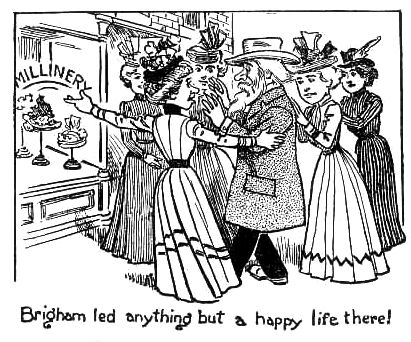


I WAS USHERED INTO this world in 1853. This was in the olden slavery days, but the bloody war that liberated so many others brought, no such boon to me. I have served many masters and, though it may not become me to say so, I have always been good and as efficient as my natural limitations would permit, for, although I was not deformed, I was considerably smaller than others of my family. Though I always did my duty faithfully, such is the world's ingratitude that few of my masters hesitated to get rid of me.
The first one I remember was a Southern planter who spent most of his time in barrooms. He was an inveterate gambler. He took me with him to a saloon one day. He had been losing heavily and was in a bad temper. He tried to vent his spleen on me, and seizing me, threw me up into the air so I landed on my head while the stars danced about me. I turned tail at this, and left him casting my lot in with one of his companions who seemed to be less of a brute. But it wasn't long before he got rid of me to a tramp. My new master and I became very much attached to each other, and though we led a roving life, sleeping in barns and empty freight cars, I always had as much to eat as I required, and I felt sure that there must be many who were not a quarter as well off as I would who envy my lot. But my contentment was not to last long, for a few days later he traded me off for a pipe. Think of it, a mere wooden pipe! I grieved at what I then considered heartlessness, but contact with the world has since rubbed off all sentimentality and other ear-marks of youth.
I will not weary you with a history of all my wanderings. Suffice it to say, after many vicissitudes I reach reached New York, where I entered the service of a lady who kept a boarding house. I didn’t stay long with her, for after a day or two she gave me to the butcher.
He got rid of me soon to a little girl whom her mother had sent for sausage, and I must confess I was not sorry to make the change, for my new owner had a kind face. When she brought me home her mother said that she might keep me for her very own and I began to hope that my roving life had come to an end. My chief objection was that she kept me in a dark closet in her room. I wondered if there were any brighter quarters in the house, but if there were I never got a chance to see them, for I was kept a prisoner in this narrow cell where the only glimpse of light I got was when my little mistress opened the door to get out one of the many dresses that hung about me. But one day when she was giving a party to her girl friends she brought me out and proudly showed me to her companions. Immediately I became an object of envy and one little girl more eager than the rest to own me offered her bracelet for me which I am very sorry to say my little mistress accepted. But my new possessor was like all the rest—she parted with me without a twinge, and I shall never forget my feelings when she passed me one day in a dry goods store while out shopping without even giving me a second look. I am tired of this world, but there is no help for me. I came from a long lived family and there seems to be no end to any of us. If I prayed to Fate to put an end to me I wonder if I would be refused.
That autobiography of a silver quarter of a dollar tells of its being stamped in 1853 and re-fused when it was worn smooth.
2. A REBUS.
In fruitful field my first they grew,
My busy next there labored too;
A hardy race my whole you’ll find,
To husbandry and peace inclined.
Cypher Ans. 16, 5, 1, 19, 1, 14, 20, 19.
FEASANTS
3. Concealed Geography
Our class in concealed geography is asked to discover the hidden locality of a little incident which occurred when the much-married Brigham Young endeavored to escort his bevy of wives past a display of spring millinery.

Bingham was in Utah.
4. CONCEALED GEOGRAPHY.
Here is a collection of hidden cities, etc.. For the juvenile class to discover in the sentences.
1. There is one thing you should be constant in—O plebeian!
2. The Empress Regent thinks she is a Maria Theresa.
3. Old wine, old books, old friends are the best.
4. Jump on, are you all on, don’t forget the baby.
5. He used a new preparation for his teeth.
6. They say that our small dog is dead.
7. I galloped to Lynn and met Zechariah galloping back.
S. Lord Bacon was a great thinker many years ago.
9. King Alfred, in burgher cloths, burnt the cakes.
10. O mighty Tiber, gently flowing to the sea!
11. No knowledge, no attainments, can take the place of goodness.
12. The Crown Prince can even balk a Napoleon.
13. The amber lining of her coat was all faded.
1. Constantinople, 2. Samaria, 3. Thebes, 4. London, 5. Sedan, 6. Tours, 7. Metz, S. Inkermann, 9. Edinburgh, 10. Bergen, 11. Genoa, 12. Balkan, 13. Berlin.
5. A REBUS.
Here is an odd rebus which everyone cannot see through even when knowing the answer to be the letter R.
Whether old Homer tippled wine or beer,
Julep or cider, history is not clear;
But strange it is—the bard, though wont to roam,
But for one liquid, ne’er had left home.
[Page 182]